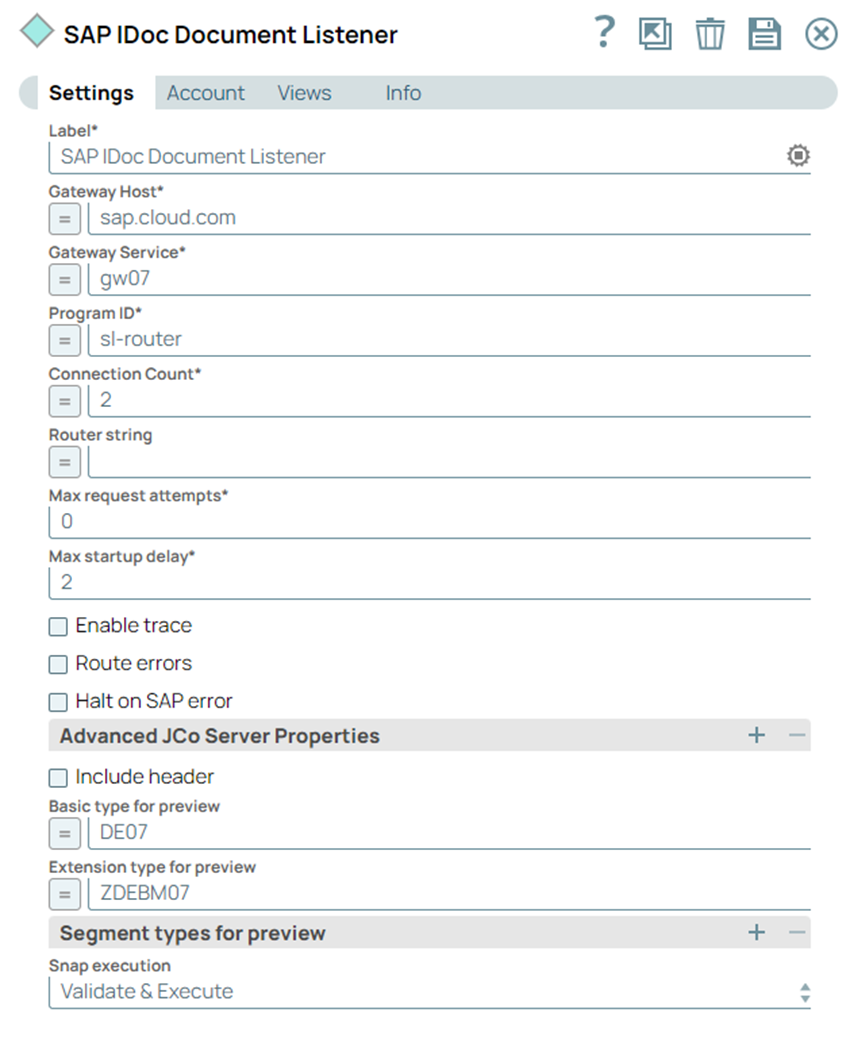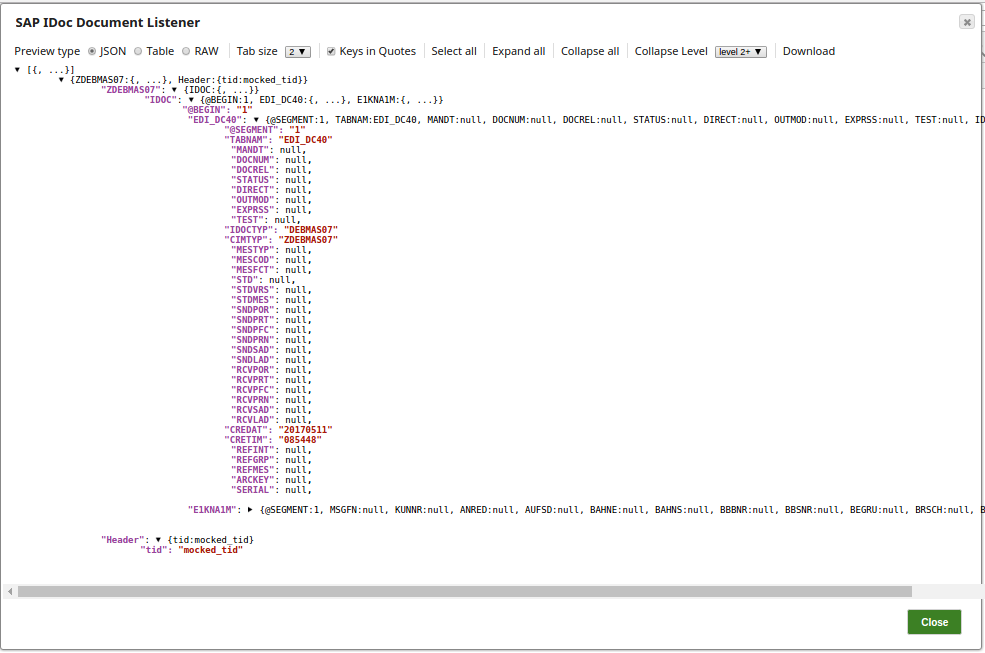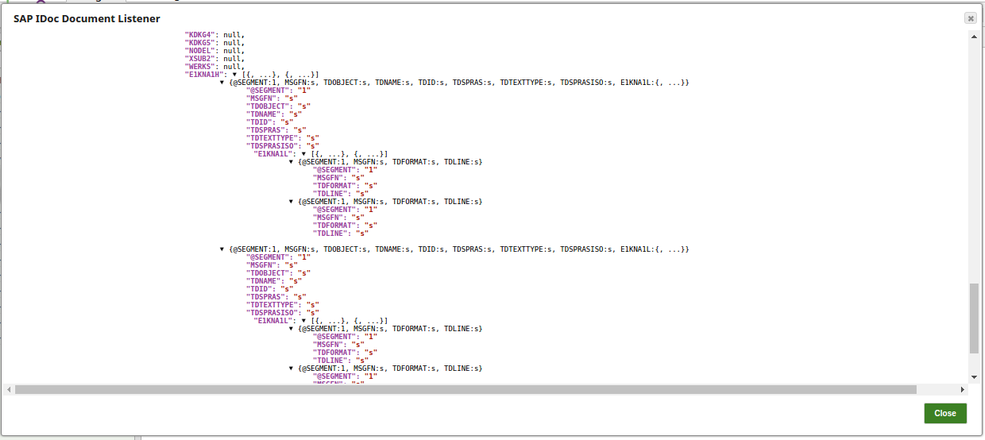SAP IDoc Document Listener
On this Page
| Snap type: | Flow | ||||||
|---|---|---|---|---|---|---|---|
| Description: | This Snap receives SAP IDoc requests and sends the IDoc data contained in the requests to the output view. SAP IDoc Listener runs a JCo IDoc server that listens and receives IDoc requests, which means once a pipeline with an SAP IDoc Listener Snap is started, the pipeline won't finish and the user needs to stop the pipeline manually when needed. If Include header is checked, the TID (Transaction ID) of a IDoc request will be put in a header object along with the IDoc with the key as "tid" and sent to the output view. This Snap records logs of JCoDestination's connection pool's status each time it receives an IDoc request. The logs can be seen in Dashboard.
| ||||||
| Prerequisites: | The SAP Snaplex machine's service file should be configured for the SAP gateway service: You need to add the SAP Gateway service entry to the file. For example, if the Gateway service is sapgw01, the line entry like this should be added to the file: | ||||||
| Support and limitations: | Works in Ultra Tasks. | ||||||
| Account: | This Snap uses account references created on the Accounts page of SnapLogic Manager to handle access to this endpoint. See Configuring SAP Accounts for information on setting up this type of account. | ||||||
| Views: |
| ||||||
Settings | |||||||
Label | Required. The name for the Snap. You can modify this to be more specific, especially if you have more than one of the same Snap in your pipeline. | ||||||
| Gateway host | Required. The address of SAP gateway host on which the IDoc listener will be registered. Example: sap.cloud.com Default value: N/A | ||||||
| Gateway service | Required. The SAP gateway service, usually in the format of "sapgwNN", in which NN stands for two digits. Example: sapgw01 Default value: N/A | ||||||
| Program ID | Required. Program ID used to register the Snap as a JCo IDoc server in the Snap on SAP gateway server. Example: Snaplogic Default value: N/A | ||||||
| Connection count | Required. The count of the registered connections managed by the JCo IDoc server in this Snap. Example: 4 Default value: 2 | ||||||
| Router string | The SAP router string to be used to access a system protected by a firewall. Such systems can only be reached using an SAP router when registering the server at the gateway of the ABAP server associated with the system. A router string typically has the following format: Default value: N/A | ||||||
| Max request attempts | This property defines the polling timeout in seconds for obtaining the IDoc processing status. If the timeout occurs while waiting for the status, the Snap displays a SnapExecutionException. Example: 300 Default value: 300 Maximum: 1800 | ||||||
| Max startup delay | Required. The maximum number of SAP connection attempts in case of a failure. When 0 is entered, the Snap tries for infinite times for the connection. Default value: 3 | ||||||
| Enable trace | Select this check box to activate JCo traces, which retrieves information about the methods invoked and the data passed through the underlying communication layers throughout the call. This information can help you analyze errors that are related to connection issues associated with the Snap's execution. Default value: Deselected | ||||||
| Route errors | Writes configuration errors to the error view. If the error is non-recoverable, especially connection errors such as exception handling would be routed to the error view with relevant information. Default value: Not selected | ||||||
Halt on SAP error | Select this checkbox to enable the Listener to interrupt and halt processing when the Snap encounters a non-connection error. We recommend you to select this checkbox when the Max request attempts is greater than 0 and you want the Snap to fail on any error received by the Listener. Zero indicates to continue to retry and not interrupt on any errors (infinite retries). Default Value: Deselected | ||||||
| Advanced JCo Server Properties | Use this field set to define JCo properties for SAP Secure Network Communications (SNC) authentication. Click to define the JCo properties. You can specify only one JCo parameter in each row. The field set contains the following fields:
| ||||||
| Property Name | Enter the name of the JCo Server property; the name should start with jco.server. | ||||||
| Property Value | Enter the value for the JCo server property. | ||||||
| Include header | If enabled, a header object containing tid will be generated in the output document. Default value: false | ||||||
| Basic type for preview | Specify the IDoc basic type that need to be shown in preview during validation. This property works only for validation. If this is empty, then no preview will be generated. Default value: N/A | ||||||
| Extension type for preview | Specify the IDoc extension type that need to be shown in preview during validation. This property works only for validation. This property must be used with basic type for preview. Default value: N/A | ||||||
| Segment types for preview | Specify segment types that need to be shown in preview during validation. This property works only for validation. This property must be used with basic type for preview. Default value: N/A | ||||||
Snap Execution | Select one of the following three modes in which the Snap executes:
Default Value: Execute only | ||||||
Examples
In this pipeline, the SAP IDoc Document Listener Snap sends the documents to an output view that shows the schema of a specified IDoc type. The output is then written to a file using the File Writer Snap.
On the Snap settings, provide the Basic type of the IDoc, DEBMAS07, Extension type, ZDEBMAS07, and the Segment type, E1KNA1H to be shown during the validation. Note if the Segment type is not provided with, the Snap displays all the segment types of the IDoc.
The output preview from the Snap:
Downloads
Important steps to successfully reuse Pipelines
- Download and import the pipeline into the SnapLogic application.
- Configure Snap accounts as applicable.
- Provide pipeline parameters as applicable.
Have feedback? Email documentation@snaplogic.com | Ask a question in the SnapLogic Community
© 2017-2025 SnapLogic, Inc.



